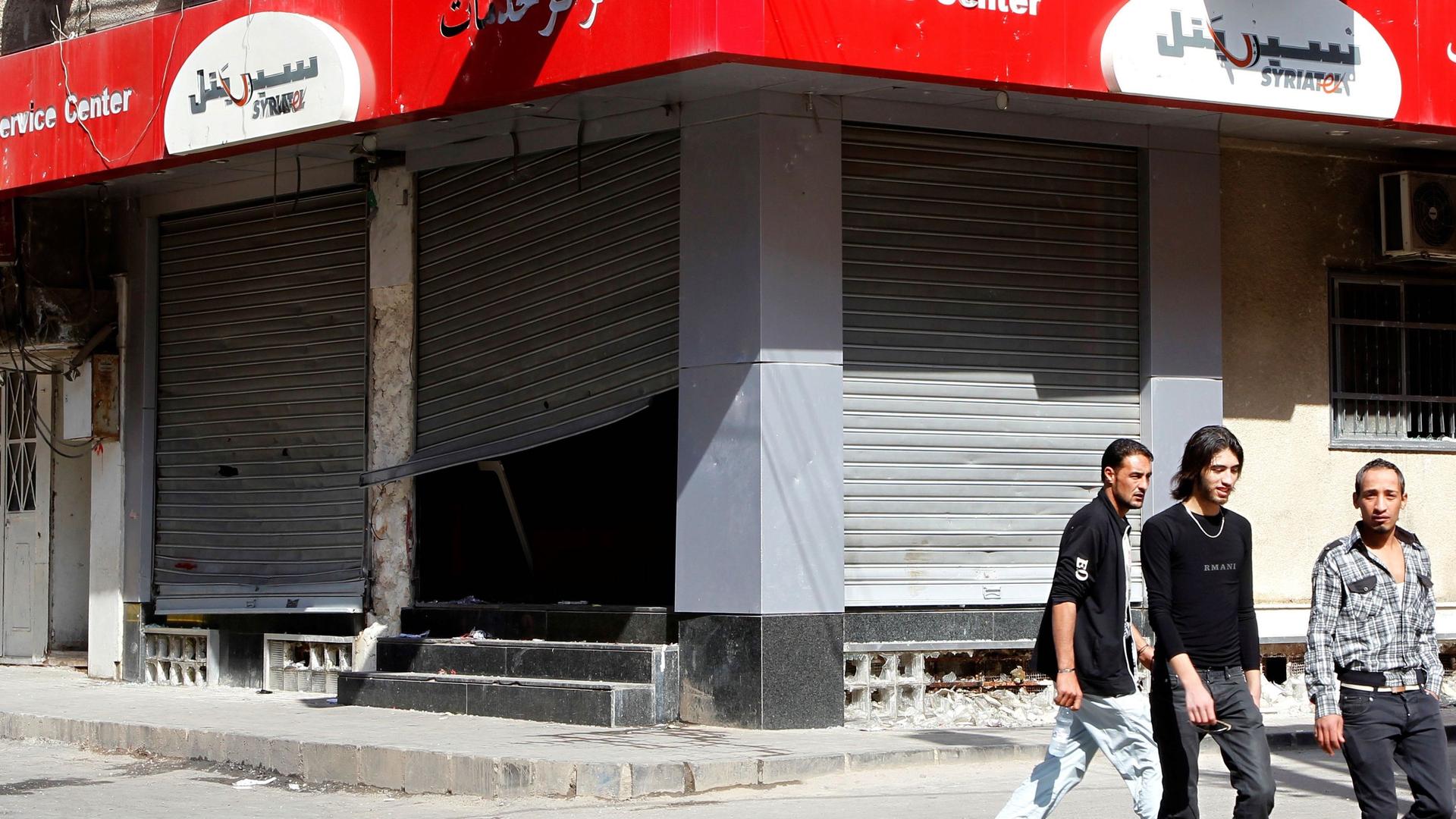People walk past the looted premises of cellphone company Syriatel, which is owned by Rami Makhlouf, the cousin of Syria’s President Bashar al-Assad, in Deraa, March 21, 2011.
The inner workings of the powerful Assad family have remained under close wraps in the past five decades or so since Hafez al-Assad took control of Syria in a coup.
On the surface, all seemed fine between the ruling elites.
That’s until a few weeks ago when the public got a rare glimpse into what appears to be a rift between Syrian President Bashar al-Assad and his maternal cousin, Rami Makhlouf.
Makhlouf is a billionaire whose financial empire in Syria spans everything from telecommunications to real estate to construction to oil.
Related: Syrian officials on trial for war crimes in Germany
Before the country’s civil war, Makhlouf controlled 60% of Syria’s economy, according to reports. At one point, he was so powerful, he owned his own militia.
But it seems that something has changed within the Assad family’s inner circle — and not in his favor.
In a recent series of Facebook videos, Makhlouf complained that the Syrian government has been pressuring him to pay millions of dollars it claims he owes in unpaid taxes and duties.
Makhlouf addresses the president directly in the videos — something no other family member has done before.
“It is actually very, very suspenseful,” said Asser Khattab, a Syrian journalist based in France.
Related: ISIS families held in Syrian camps face uncertain futures. Now, the coronavirus also looms.
“I have friends who have not really cared about following what’s happening in Syria. They’re Syrians, but they don’t really care about following. They’ve moved on, they went to Germany or to America, but they are sitting and watching those Makhlouf videos because it’s just too suspenseful to miss.”
“I have friends who have not really cared about following what’s happening in Syria,” he said. “They’re Syrians, but they don’t really care about following. They’ve moved on, they went to Germany or to America, but they are sitting and watching those Makhlouf videos because it’s just too suspenseful to miss.”
In fact, the videos are so suspenseful that some Syrians are calling them the “Makhlouf Musalsal.” Musalsals are popular TV series that typically air during Ramadan across the Middle East.
In the videos, Makhlouf, the man who was until recently a powerful tycoon, sits on the floor of what looks like a posh villa.
“No one expected to see Rami Makhlouf, the mysterious, strong businessman, cousin of the president, to be sitting on the floor and pleading to the president, seemingly not having any other means of communicating with his cousin now,” Khattab said.
Related: Can COVID-19 be contained in war-torn Syria?
Bashar al-Assad, the president, hasn’t responded directly. But his government has.
A number of government documents have popped up online, including one reportedly issued by the finance ministry, which shows an order to seize Makhlouf’s assets in 12 banks.
Another bans Makhlouf from leaving the country.
“This is the side of the Syrian state that we have never seen before. Some people view it as that the Assad family has finished devouring the state and its resources — and now they have started to devour each other.”
“This is the side of the Syrian state that we have never seen before,” Khattab said. “Some people view it as that the Assad family has finished devouring the state and its resources — and now they have started to devour each other.”
It’s not exactly clear what’s behind the spat between Bashar al-Assad and his cousin.
But, former Syrian diplomat Bassam Barabandi said the episode could turn out to be helpful in holding Syrian officials accountable.
Barabandi, who worked for the Syrian government until 2013, said that some of the money in dispute is not in Syria, but likely “in Europe, Romania, Dubai or Moscow.”
That’s why, Barabandi said, American and European officials should be watching this family dispute closely.
Related: This Syrian is stuck at a makeshift border camp in Greece
“If I’m in the [US] Treasury, I think I will see a lot of big money is moving in the market in a way that doesn’t make sense. And I think this is an opportunity for the Treasury or for the US government and the EU, in general, to confiscate this money or to freeze this money.”
“If I’m in the [US] Treasury, I think I will see a lot of big money is moving in the market in a way that doesn’t make sense,” he said. “And I think this is an opportunity for the Treasury or for the US government and the EU, in general, to confiscate this money or to freeze this money.”
The US and EU sanctioned Makhlouf in 2008.
Khattab, the journalist, expects more of this high-level family feud to play out in public. And with every new revelation, he said, Syrians will come to understand more about the family that has ruled over their country for five decades.
Our coverage reaches millions each week, but only a small fraction of listeners contribute to sustain our program. We still need 224 more people to donate $100 or $10/monthly to unlock our $67,000 match. Will you help us get there today?
